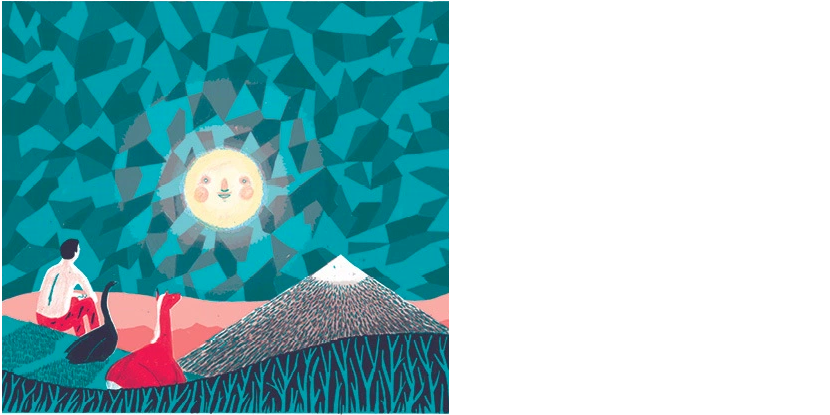Silence
 Image from the book A Graphic Cosmogony, Alex Spiro editor.
About a month ago I had laryngeal surgery and was on strict voice rest for two weeks. This was a new experience. I’ve been on silent retreats but that experience was different. During silent retreats everyone is practicing silence and the environment is very constrained–we meditate, do work practice, study, and eat all in silence at a retreat center. With this experience I was out and about in everyday life. I was teaching my university classes without speaking. I would type out the few things I wanted to say and display them using a projector. If a student asked a question, I would answer in the same way. I was amazed at all the ideas students had when allowed to express themselves without interruption or comment. In one night, I found and read a book on the web, “Stop Talking: Indigenous Ways of Teaching and Learning and Difficult Dialogues in Higher Education.” The authors talk about teaching at an ‘earth-based pace’ and advise:
Image from the book A Graphic Cosmogony, Alex Spiro editor.
About a month ago I had laryngeal surgery and was on strict voice rest for two weeks. This was a new experience. I’ve been on silent retreats but that experience was different. During silent retreats everyone is practicing silence and the environment is very constrained–we meditate, do work practice, study, and eat all in silence at a retreat center. With this experience I was out and about in everyday life. I was teaching my university classes without speaking. I would type out the few things I wanted to say and display them using a projector. If a student asked a question, I would answer in the same way. I was amazed at all the ideas students had when allowed to express themselves without interruption or comment. In one night, I found and read a book on the web, “Stop Talking: Indigenous Ways of Teaching and Learning and Difficult Dialogues in Higher Education.” The authors talk about teaching at an ‘earth-based pace’ and advise:
Stop Talking
Set down your electronic devices. Set down your books and your pens. Go outside if possible; otherwise, find a window. And then for a minute or two, let go of your thoughts and listen to the wind. Pay attention to the land you are standing on and to the living things that share your space. Breathe intentionally from the common air. Notice how you feel. Stay with it as long as possible. Return to it as often as necessary
During my two weeks of silence, when I was out in the woods walking with my wife, Cheryl, and dogs, in addition to listening to the wind, I would listen to Cheryl talk about something that happened at work, or some idea she had and not interrupt her. And listening to her I realized how much I must interrupt her. Initially, I felt frustrated that I couldn’t respond, but with days of practice I grew more comfortable just listening and felt I was really hearing her voice and who she was.
This whole experience made me think about listening and how sometimes–maybe MOST times–people just want to be heard.
When someone says something, they don’t want to be interrupted to hear my, official “What does Ron Zacharski think”, take on what they are saying. For a number of years I was involved in an online Zen book study group. After a person would say something about a life experience, it would be common for someone to offer an opinion or unasked for advice. Perhaps the best response to someone who shares something about their life is quiet acknowledgement.
Gloria Steinem in her book “My Life on the Road” writes:Many of these quotes are from the wonderful website brainpickings.org by Maria Popova, an amazing and talented professional reader.
One of the simplest paths to deep change is for the less powerful to speak as much as they listen, and for the more powerful to listen as much as they speak.
She writes:
When people ask me why I still have hope and energy after all these years, I always say: Because I travel. Taking to the road—by which I mean letting the road take you—changed who I thought I was. The road is messy in the way that real life is messy. It leads us out of denial and into reality, out of theory and into practice, out of caution and into action, out of statistics and into stories—in short, out of our heads and into our hearts
People in the same room understand and empathize with each other in a way that isn’t possible on the page or screen. Gradually, I became the last thing on earth I would ever have imagined: a public speaker and a gatherer of groups. And this brought an even bigger reward: public listening.
She suggests:
Spend some time on the road… in an on-the-road state of mind, not seeking out the familiar but staying open to whatever comes along. It can begin the moment you leave your door.
Like a jazz musician improvising, or a surfer looking for a wave, or a bird riding a current of air, you’ll be rewarded by moments when everything comes together. Listen to the story of strangers meeting in a snowstorm that Judy Collins sings about in “The Blizzard,” or read Alice Walker’s essay “My Father’s Country Is the Poor.” Each starts in a personal place, takes an unpredictable path, and reaches a destination that is both surprising and inevitable — like the road itself.
More reliably than anything else on earth, the road will force you to live in the present.
Be well.